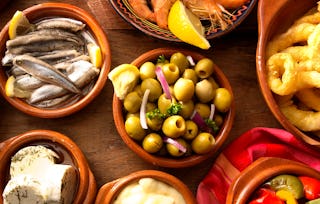¡Hola! ¿Como Estas? In this entry level course, you will take the first step toward exploring the foundations of Spanish grammar and pronunciation, and will begin to build a working vocabulary of common Spanish words and expressions. You will be able to talk about yourself, your family and friends in the present tense, and begin to explore the cultural context of the Spanish-speaking world through a series of videos and interactive activities, including speaking, reading and writing exercises. The adventure begins here, so ¡vámanos!

Spanish Vocabulary: Meeting People
Ends soon: Gain next-level skills with Coursera Plus for $199 (regularly $399). Save now.

Spanish Vocabulary: Meeting People
This course is part of Learn Spanish: Basic Spanish Vocabulary Specialization

Instructor: Dr. Robert Blake
263,219 already enrolled
Included with
(3,304 reviews)
Details to know

Add to your LinkedIn profile
18 assignments
See how employees at top companies are mastering in-demand skills

Build your subject-matter expertise
- Learn new concepts from industry experts
- Gain a foundational understanding of a subject or tool
- Develop job-relevant skills with hands-on projects
- Earn a shareable career certificate

There are 4 modules in this course
The first module introduces Spanish grammar and pronunciation and you will begin to build your Spanish vocabulary. By the end of the module, you’ll be able to talk about yourself and your family and will be able to count to 10 in Spanish. We’ll also discuss and practice the “ar” verbs and the useful verb tener. By the end of the module you will have started laying the foundations of your vocabulary.
What's included
15 videos4 readings6 assignments1 discussion prompt
In module 2, you’ll continue to build your Spanish vocabulary and will be able to talk about the body and physical sensations using the verb estar. Building on the vocabulary you learned in the first module, you will also able to count to 100. Throughout the module, we’ll practice conjugating the “ar,” “er” and “ir” verbs in the present tense.
What's included
11 videos2 readings6 assignments1 discussion prompt
In this module you’ll continue to build your Spanish vocabulary as we discuss the topics of places and weather. We’ll continue to practice the “ar,” “er” and “ir” verbs, and we’ll introduce some irregular verbs. By the end of the module, you’ll also be able to make comparisons using possessive adjectives. You’ll engage with a native of Mexico and explore her native city.
What's included
14 videos2 readings6 assignments1 discussion prompt
In the final assignment for this course, you will write a brief introduction about yourself in Spanish (approximately 100-200 words) to tell your peers a little about yourself. You will then record and upload a video of you reading this introduction to the class. Click on the Peer Review activity link below to learn more about this assignment.
What's included
1 video1 peer review
Earn a career certificate
Add this credential to your LinkedIn profile, resume, or CV. Share it on social media and in your performance review.
Instructor

Offered by
Explore more from Other Languages
 Status: Free Trial
Status: Free TrialUniversity of California, Davis
 Status: Free Trial
Status: Free TrialUniversity of California, Davis

Universidades Anáhuac
 Status: Preview
Status: PreviewUniversidades Anáhuac
Why people choose Coursera for their career




Learner reviews
3,304 reviews
- 5 stars
75.66%
- 4 stars
16.25%
- 3 stars
2.63%
- 2 stars
1.39%
- 1 star
4.05%
Showing 3 of 3304
Reviewed on Jul 16, 2020
Really loved this course. I already started learning the basics before enrolling for this course, but still I found this course really useful. I'll definitely finish all the courses in this series.
Reviewed on Jan 6, 2021
Good content. Covers basics and helps to simplify grammar. A lot of self learning and practice videos available. The assignments with written and spoken Spanish as well. Highly recommend.
Reviewed on Oct 25, 2020
I have loved this course so far! I feel like I am learning quickly. I really enjoy the videos, the content, the perspectives, and the scheduled weekly routines. Awesome course! Thank you!
Frequently asked questions
To access the course materials, assignments and to earn a Certificate, you will need to purchase the Certificate experience when you enroll in a course. You can try a Free Trial instead, or apply for Financial Aid. The course may offer 'Full Course, No Certificate' instead. This option lets you see all course materials, submit required assessments, and get a final grade. This also means that you will not be able to purchase a Certificate experience.
When you enroll in the course, you get access to all of the courses in the Specialization, and you earn a certificate when you complete the work. Your electronic Certificate will be added to your Accomplishments page - from there, you can print your Certificate or add it to your LinkedIn profile.
Yes. In select learning programs, you can apply for financial aid or a scholarship if you can’t afford the enrollment fee. If fin aid or scholarship is available for your learning program selection, you’ll find a link to apply on the description page.
More questions
Financial aid available,





